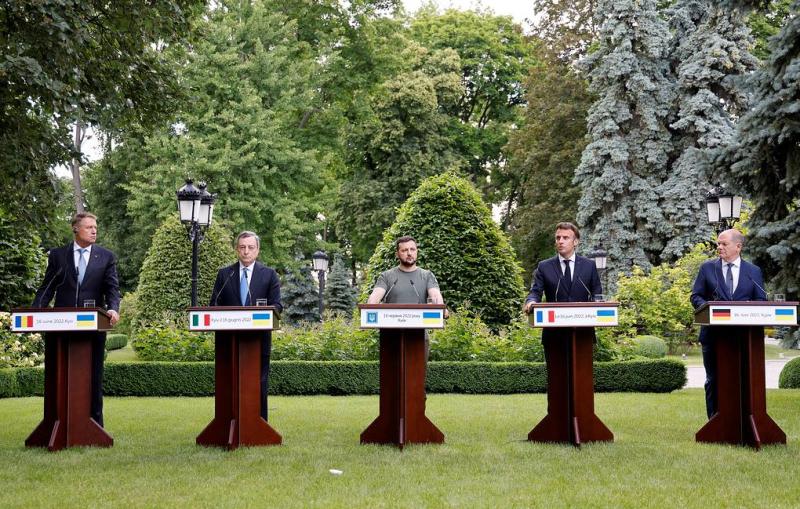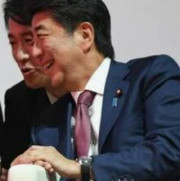
© EPA-EFE/LUDOVIC MARIN/POOL
Top stories from the Russian press on Friday, June 17th, prepared by TASS
Vedomosti: Germany, France and Italy support Ukraine’s integration into EU
France, Germany, Italy and Romania back immediately granting Kiev EU candidate status, French President Emmanuel Macron said after a meeting with his Ukrainian counterpart Vladimir Zelensky in Kiev on June 16. He was speaking at a joint news conference attended by German Chancellor Olaf Scholz, Italian Prime Minister Mario Draghi and Romanian President Klaus Iohannis.
At a meeting on June 17, the European Commission is expected to support Ukraine’s accession bid, and EU leaders should approve the decision at a European Council summit set for June 23-24, Vedomosti writes.
The position shared by the three largest EU countries certainly gives weight to Ukraine’s chances for getting EU candidacy, Artem Sokolov, a researcher at the Moscow State Institute of International Relations’ Center for European Studies, told the paper. And yet the consolidated stance of the aforementioned EU big-hitters does not mean Hungary, Slovakia and the Netherlands might not be opposed to granting the status, since they have doubts about Ukraine’s EU prospects, the expert said.
And the process could still take long, for chances remain that Ukraine will fail to get EU candidacy at the European Council summit on June 23-24, said Pavel Timofeev who heads the European Political Research Department at the Institute of World Economy and International Relations. Surely, the three key EU members could speed up the process to make Kiev’s wish come true, but they might face opposition from the Balkan countries and Turkey which have been stuck in their European integration for many years and for many decades respectively, he added. As for territorial concessions, the EU would push for Ukraine’s territorial integrity until the situation on the frontlines becomes disastrous, Timofeev concluded.
Izvestia: Experts say Kiev’s ambitions to hit Crimean Bridge are futile
Several Ukrainian military officials recently shared their plans to take back the Donbass republics and Crimea, Izvestia writes. Ukraine’s Defense Minister Alexey Reznikov has said the new batch of long-range artillery systems to be supplied by the West will make it possible to get back the peninsula and the entire Donbass. And Ukrainian Major General Dmitry Marchenko has claimed the Crimean Bridge was "target number one."
On June 16, both Kremlin Spokesman Dmitry Peskov and Russian Foreign Minister Sergey Lavrov assured that the Crimean Peninsula was safe, while leader of the Donetsk People’s Republic Denis Pushilin warned that allied forces would go beyond his republic’s borders, if additional supplies of Western armaments are delivered to the Kiev regime.
To military expert Dmitry Boltenkov, politicians and top military officials in Kiev are no longer in touch with reality. "It is completely unclear where Ukrainian forces will get troops and equipment for larger scale operations," he told the newspaper. "The HIMARS [the US has promised to send to Ukraine] is unlikely to provide any breakthrough, as dozens and even hundreds of these rocket systems and trained crews will be needed for any tangible effect, while Kiev cannot afford that," the expert stressed.
Nor would Kiev be able to hit the Crimean Bridge, Boltenkov added. "They will be supplied with HIMARS rockets that cannot reach it from the territories under their control, and they stand absolutely no chance of delivering these somewhat closer either by sea, by land or by air, so the bridge is safe," he insisted.
Izvestia: West shrugged off concerns repeatedly voiced by Russia, Bosnian Serb leader says
The West is willing to triumph over Russia by sending weapons to Kiev without taking an active part in the military operations in Ukraine, Bosnian Serb leader Milorad Dodik told Izvestia on the sidelines of the St. Petersburg International Economic Forum.
Western countries had been ignoring the fears and worries repeatedly voiced by Russia that had its legitimate concerns over the deployment of military infrastructure closer to its borders, that’s why the world is currently faced with the conflict raging in Ukraine, Dodik said. He supposed some in the West might have been seeking to ignite this conflict between Moscow and Kiev, yet what he finds even more disturbing is the fact that there is no dialogue between the conflicting sides.
Nobody’s in a hurry to reach agreements, and everybody seems to be waiting for a military resolution instead, the politician noted. Meanwhile, like any war, this confrontation has brought suffering and casualties among the civilian population. The West, a while ago, bombed the Serbs for humanitarian reasons, and it has been supplying weapons to Ukraine allegedly for humanitarian purposes, while triggering a dire dilemma for the ex-Soviet nation.
Dodik said Bosnia and Herzegovina was resolutely against NATO membership, and the Balkan country’s enthusiasm for joining the European Union is rather low. At least it’s not as intense as it was, say, a decade ago, and everything will depend more on how Europe will develop, whether it will not be under US influence, he emphasized. Yet, Dodik said, his country was not opposed to integration, but the process should proceed along terms that would be acceptable for it.
Vedomosti: Nord Stream might be fully frozen over Canada’s sanctions
Nord Stream with an annual project capacity of 55 billion cubic meters of gas could stop completely, Russia’s envoy to the EU, Vladimir Chizhov, said on the sidelines of the St. Petersburg International Economic Forum on Thursday. "When all its turbines are taken to Canada for repairs, it could see a total halt, and I think that will be a disaster for Germany," he warned.
A Siemens Energy spokeswoman explained that the turbines under repairs could not be returned from Montreal over Canada’s sanctions. She said the governments of Canada and Germany had been notified and "a viable solution" was being sought for.
Nord Stream is Russia’s largest operating gas export route. Pipeline operator Nord Stream AG said 59.2 billion cubic meters of gas were transported through it in 2021, when, according to an International Energy Agency estimate, Russia exported about 140 billion cubic meters of gas to the EU. This means that supplies via Nord Stream amounted to some 42%.
The pipeline could be fully frozen, since the work of its turbines is at stake, Deputy Director General of Russia’s National Energy Security Fund Alexey Grivach told Vedomosti. "The turbines that are still operating now will sooner or later stop working, because they will need repairs and components," he said. While this could be nonessential for the EU this summer, the Europeans might not get 80% of their gas storage facilities filled by November, he warned.
Gazprom is not giving up on its Nord Stream exports, yet the Russian gas giant has stressed that it cannot supply gas in the previous volumes citing technical reasons related to the sanctions, a source in the gas industry told Vedomosti. Gazprom could try to "cajole its Western partners to negotiate on the issue along legal lines," he said. And since the EU will not be able to cancel its Russian gas exports before 2026, "the parties will be seeking a compromise, for example gas could be exchanged for European gas production or liquifying technology," he added.
Kommersant: Russia's ‘pivot to the East’ debated at SPIEF
Russian companies have already rerouted part of their exports from the West to the East, with the turnover at ports in the country’s Far East rising 46% year-on-year. However, the majority of market players who took part in the SPIEF discussions on Thursday used cautious rhetoric, as new counterparties in Asia are needed and transportation capacities should be expanded, they said.
On the first day of the forum, participants actively discussed foreign trade reform and new logistics. Central Bank Governor Elvira Nabiullina called for reviewing the benefit of exports at the morning session. "The external situation has changed for the long-term outlook, if not forever," and "we should consider how to make the bulk of production work for the domestic market."
Exporters do not feel encouraged, and they have been looking for ways to have their export routes changed. Exports along north-western routes have already decreased by more than 80%, while eastbound exports have risen 14%. "We cannot push tens of millions of tonnes of cargoes through," Minister for Far East and Arctic Development Alexey Chekunkov complained. The export infrastructure is lacking coal, food and other supplies, he said pledging to expand the capacity of ports.
And the departure of foreign freight companies could lead to a deficit of vessels and container ships, FESCO board chairman Andrey Severilov warned. Buying new vessels is more expensive now, and the cost of freight using other channels, in particular from the Black Sea port of Novorossiysk to China, has increased. Companies have been asking for state subsidies for the construction of additional facilities at ports and a percentage rate viable for buying container ships.









